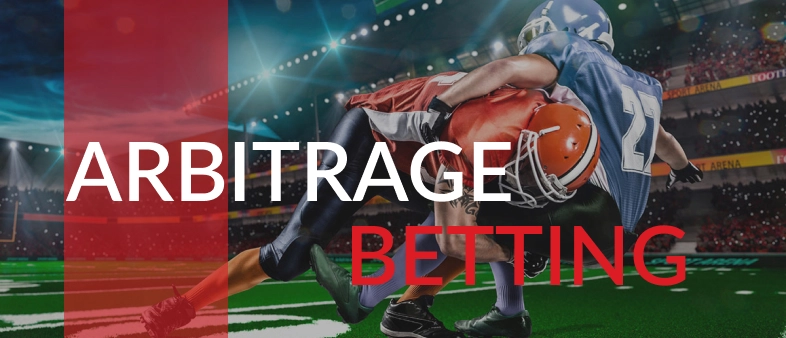Arbitrage betting

Bookmakers are designed with a built-in profit margin, meaning it is incredibly hard to maintain a profit in the long run. One of the only strategies that allow you to constantly grow your bankroll is to use arbitrage. Using this betting method it is irrelevant who wins and who loses because every outcome is bet on at different bookmakers covering every result.
Warning! Bookmakers do not appreciate you using this strategy and when they realise this is what you are doing there are sanctions, normally restricting the amount of money which you can win from each bet, and occasionally attempting to void your winnings.
Arbitrage betting: How to do it
This can happen at bookmakers if you bet on every possible outcome or you can back at the bookmaker and «lay» the same bet on an exchange. For numerous reasons bookmakers will have different opinions on what the odds should be and in order to remain competitive and also to maintain a balanced book, they will occasionally have arbitrage situations.
Examples of opposite outcomes:
Player 1 - Player 2: Who will win, player 1 or 2. Mostly relevant in sports where there is not a draw such as a tennis.
TU (2.5) - TO (2.5): What will the total goals scored be over or under a set level. This can be used in any sport where points are scored but is most common in US sports and football.
As well as opposite outcomes, which can be known as «Dutching» it is also possible to lay bets at an exchange, this is often easier to see where the arbitrage is and helps with the maths for making profits. It also allows arbitrage on anything easily, for example, horse races with many runners, which would be virtually impossible to do by backing every single horse.
Finding «Arbs»
When «arbing» online bookmakers began around the turn of the 20th Century people would manually search bookmaker odds and compare them to each other. Today you can still do that but there are many “odds scrapers” which are paid for applications which do it for you.
To do it manually (assuming only two outcomes are possible) you take 1 and divide it by the decimal odds of outcome A and then take 1 and divide it by the decimal odds of outcome B. Add these two numbers together, if it is less than 1 then you have an «arb».
As an example, let us consider the odds on a tennis event. Let's say for Djokovic's victory against Nadal odds of 2.43 are offered. Another bookmaker gives odds on Nadal of 1.84. We put the values into the formula:

It is 0.95, so less than one, so that can be profit no matter what.
Today calculators for «arbs» are used along with other services that calculate for you how much to bet on each outcome to get exactly the same profit regardless. We would suggest though that you first bet a round number on the outcome with the lowest odds, in this example, it would be £100 on Nadal at 1.84. This wins £84 in profit. Now take the next nearest round number below your profit, in this case, that would be £80, and bet this on Djokovic at 2.43. This would be £114.4 profit.
OVERALL, if Nadal wins you are +£84 and also -£80 so £4 profit. Or Djokovic wins you lose the £100 bet but win £114.4 so you are £14.4 profit overall. You profit regardless of who wins.
Even though it would be possible to stake to win exactly the same profit, either way, this draws attention to your account as an «Arber» whereas round numbers blend in with the crowd. In the long run, your profit is exactly the same either way.
Best odds guaranteed bookie:
Live betting arbitrage
In addition to the «arbs» formed before the match, it is much more common to see them in play due to the very rapidly changing odds. Most bookmakers have an «in-play delay» though, meaning if a significant event happens within a set time of a bet being struck (for example a goal being scored) that bet is voided. Because things can change in an instant it is possible that only one of your bets is placed, then the odds you saw on the other outcome either change or the bet is voided. In-play «arbing» is very risky and only for very experienced hands.
Pros and cons of «arbing» bookmakers
The downside is that as a source of income it won't last that long for you. Bookmakers do not like players who always win so employ specialists who monitor the activity of accounts. If they suspect you are doing this then they limit your account to winning just pennies on each bet, making it not worth the time is taken for you to do it. However, it can lucrative whilst it lasts, and there is no point having an unrestricted account if you are not using it to make money.













